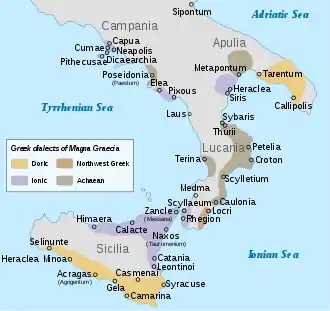Phylakopi I culture
The Phylakopi I culture (Greek: Φυλακωπή, [filakoˈpi]) refers to a "cultural" dating system used for the Cycladic culture that flourished during the early Bronze Age in Greece.[1] It spans the period ca. 2300-2000 BC and was named by Colin Renfrew, after the settlement of Phylakopi on the Cycladic island of Milos. Other archaeologists describe this period as the Early Cycladic III (ECIII).

Clay kernoi with linear decoration.
See also
External links
- The Chronology and Terminology of Aegean Prehistory, Dartmouth's Aegean Prehistoric Archaeology
References
- Eric H. Cline (ed.), The Oxford Handbook of the Bronze Age Aegean, ISBN 9780199873609, Jan. 2012.
| Wikimedia Commons has media related to Findings from Phylakopi in Milos. |
This article is issued from Wikipedia. The text is licensed under Creative Commons - Attribution - Sharealike. Additional terms may apply for the media files.
